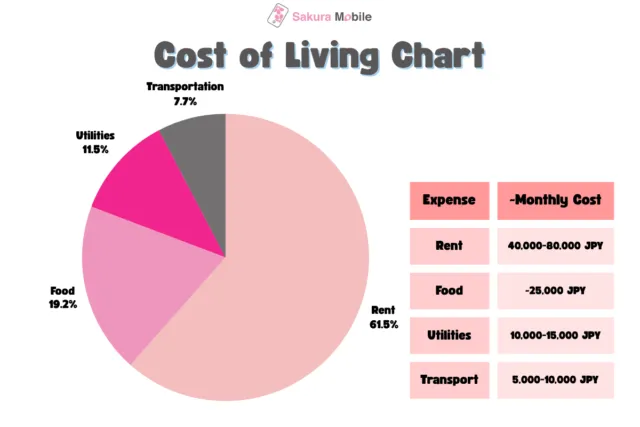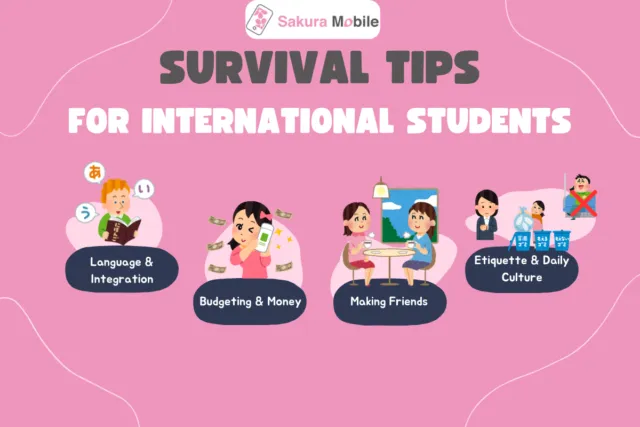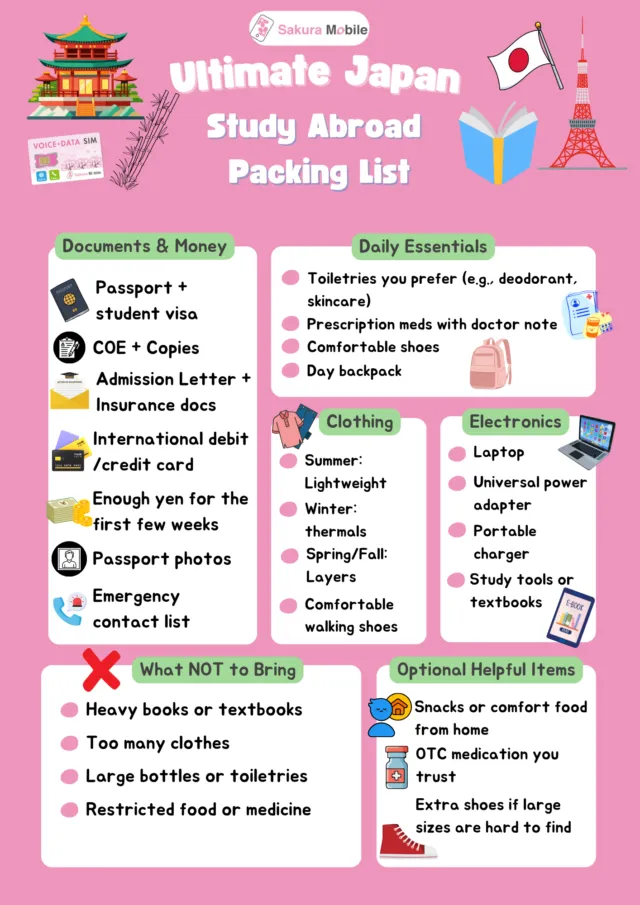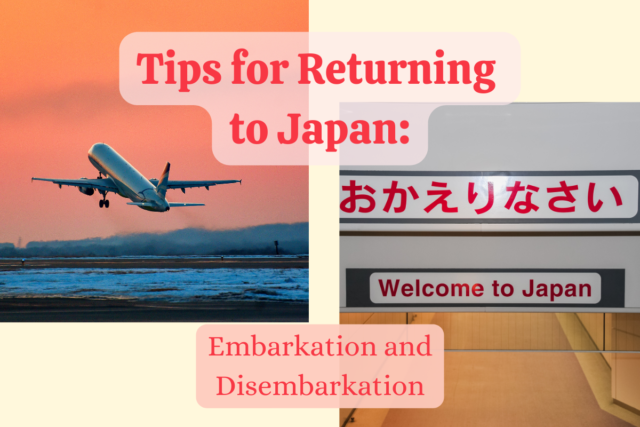Excited but nervous to study in Japan? Whether it’s your first time living abroad or your first time in Asia, this guide walks you through what to expect, how to prepare, and what to pack to thrive during your study abroad adventure.
The Sakura Mobile International Students Series will give you a guideline on not only how to prepare for studying abroad in Japan but also how to set up your life here from scratch.
Let’s start today with tips on packing and what to get done in your home country to start a smart and smooth life in Japan!
Quick Pack + Connect: Must-Do Before You Fly
Before anything else, triple check these essentials:
- DocumentsPassport, visa, COE, admission letter, and insurance documents.
- Cash & CardEnough yen for your first few weeks and at least one international debit or credit card.
- SIM/eSIMYou'll need a Japanese number for banking, school registration, and housing. Order before you fly for instant activation.
Preparing for Your Study Abroad in Japan

Understanding the Academic System
Most universities start in April or September. Expect lectures, seminars, and attendance tracking (important for your visa). Being prepared for Japan's academic structure will help you adjust faster.
Housing & Accommodation
Options include dorms, share houses, or apartments.
- TokyoHighest rent, 60,000-80,000 JPY+.
- Regional cities:Can be 20-30% cheaper.
Getting Around Japan
Japan's train and bus systems are world-class. Get an IC card (Suica, Pasmo, or ICOCA) and register a commuter pass (teikiken) once you've received your student ID. You'll save on your daily commute.
Cost of Living

According to JASSO and MEXT, the average international student spends 120,000~150,000 JPY/month (~800-1,000 USD).
| Expense | Estimated Monthly Cost |
| Rent | 40,000-80,000 JPY |
| Food | ~25,000 JPY |
| Utilities | 10,000-15,000 JPY |
| Transport | 5,000-10,000 JPY |
Budget Tip: Living outside Tokyo can reduce total expenses up to 30%.
Survival Tips for International Students

Learn Basic Japanese
Many city halls and universities offer free classes. Even a few phrases help you navigate daily life more easily. Try apps like HelloTalk or Duolingo before you arrive.
Budget & Money
Most banks require a Japanese phone number to open an account—another reason to have your SIM.eSIM ready before arrival. Japan still relies heavily on cash, so keep some yen handy.
Making Friends & Building Community
Joining student clubs, international exchange groups, or part-time jobs (arubaito). You'll meet locals and other students fast.
Etiquette & Daily Culture
- Keep quiet on trains
- Sort your garbage correctly
- Be punctual for class
These small habits make life smoother and show respect for local culture.
Stay Connected
Having a Sakura Mobile SIM or eSIM means you can access university emails, navigate and set up banking or housing right away.
The Ultimate Japan Study Abroad Packing List (2026)

Must Bring Items
- Passport + student visa
- COE + copies
- Admission letter + insurance documents
- International credit/debit card
- Enough yen for the first few weeks.
- Passport photos (ID-sized)
- Emergency contact list
Pro Tip: A working phone number is required for many services—from signing leases to registering at city hall.
Preorder your eSIM before departure.
Daily Essentials
- Toiletries you prefer (e.g., deodorant, skincare)
- Prescription meds (with a doctor's note)
- Comfortable shoes
- Day backpack
Clothing (By Season)
- Summer: Lightweight clothes, breathable fabrics.
- Winter: eWarm coat, thermals.
- Spring/Fall: Layers, hoodies, light jacket.
- Comfortable walking shoes.
Electronics & Study Tools
- Laptop
- Universal power adapter
- Portable charger/power bank
- Study tools or textbooks (digitals preferred)
Optional Helpful Items
- Snacks or comfort food from home
- OTC medications you trust.
- Extra shoes if large sizes are hard to find.
What NOT to Bring
- Heavy textbooks (use e-books)
- Too many clothes
- Large bottles of toiletries
- Restricted food or medicine.
Quick Packing Recap
- Documents: Passport, visa, COE
- Money: Yen cash + international card
- Connectivity: SIM/eSIM
Tip: Most everydday items are easy to find in Japan, so pack light and save room for souvenirs.
Stay Connected From Day One
Before your flight, set up your phone plan to avoid airport stress and roaming fees.
A Voice + Data eSIM/SIM gives you everything you need to live like a local:
- A Japanese phone number for school and banking
- Fast, reliable docomo network
- Full English setup and customer support
Recommended for: exchange students, degree seekers, and long-term stays.
FAQ
- Q: What should I pack for studying in Japan?
A: Prioritize documents, cash/cards, SIM/eSIM, essentials, and weather-appropriate clothes. Avoid overpacking.
- Q: Do I need a SIM card to open a bank account?
A: Yes. Most banks require a Japanese phone number. A Sakura Mobile eSIM can be activated before arrival.
- Q: How much does it cost to live in Tokyo as a student?
A: Roughly ¥90,000-¥130,000 per month depending on rent and commute.
- Q: Can I find large shoe sizes in Japan?
A: Sizes over 27-28 cm are rare, so bring extras if you can.
- Q: Are there cheap Japanese classes for international students?
A: Yes, most ward offices or local organizations offer them for free or a small fee.
FAQ
Final Tip: Stay Connected, Stay Prepared

Studying abroad is exciting—but staying connected makes everything easier. Whether it's checking housing info, contacting your school, or navigating your new city, a Sakura Mobile SIM or eSIM keeps everything running smoothly from day one.
Resources & Next Steps
- How to Get a Japanese Phone Number: Online Contracts and More!
- Find Apartments, Housing, and WiFi for Foreigners in Tokyo
- Best VPN for Streaming in Japan
- Best SIM Cards in Japan | Cell Phone Plans for Long-Term Stay
- (Part 2) Upon Arriving: What to Get Done at the Airport
- (Part 3) After Arrival: 4 Important Procedures to Get Done Right Away
- (Part 4) Setting Up Utilities and Internet
- (Part 5) Furniture Shop Recommendations
- (Part 6) How to Find Part-Time Jobs in Japan (Arubaito)
- (Part 7) Shopping for Groceries in Japan












